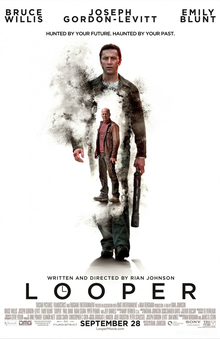P A
Bluelighter
A movie that I had predicted would be another hackneyed, low-concept CGI/sci-fi bonanza turned out to be one of the best films I've seen this year. Considering its relatively meager budget of $30,000,000 (cf. Prometheus's budget of 130 mil; about 4.3 times as much), film-making of this quality is more than worthy of all the praise.
From the Wikipedia article of the same name:
What do you think, F&T?

From the Wikipedia article of the same name:
Looper is a 2012 American science fiction action film written and directed by Rian Johnson. The film stars Bruce Willis, Joseph Gordon-Levitt, and Emily Blunt. In Looper, time travel is invented by the year 2074 and, though immediately outlawed, is used by criminal organizations to send those they want killed into the past where they are killed by "loopers", assassins paid with silver bars strapped to their targets. Joe, a looper, encounters himself when his older self is sent back in time to 2044.
What do you think, F&T?





